Your cart is currently empty!
Natural Treatments for ECC (Early Childhood Caries)
Mama, I’m so glad you’re here. Because if you are searching Dr. Google, DDS, to find natural treatments for ECC (early childhood caries), you are probably in the midst of an emotional situation right now. And you need the hope and encouragement that is in this post.
You have just discovered your child has early childhood caries/tooth decay. You are devastated. Shocked. Appalled. Guilt-ridden. Confused.
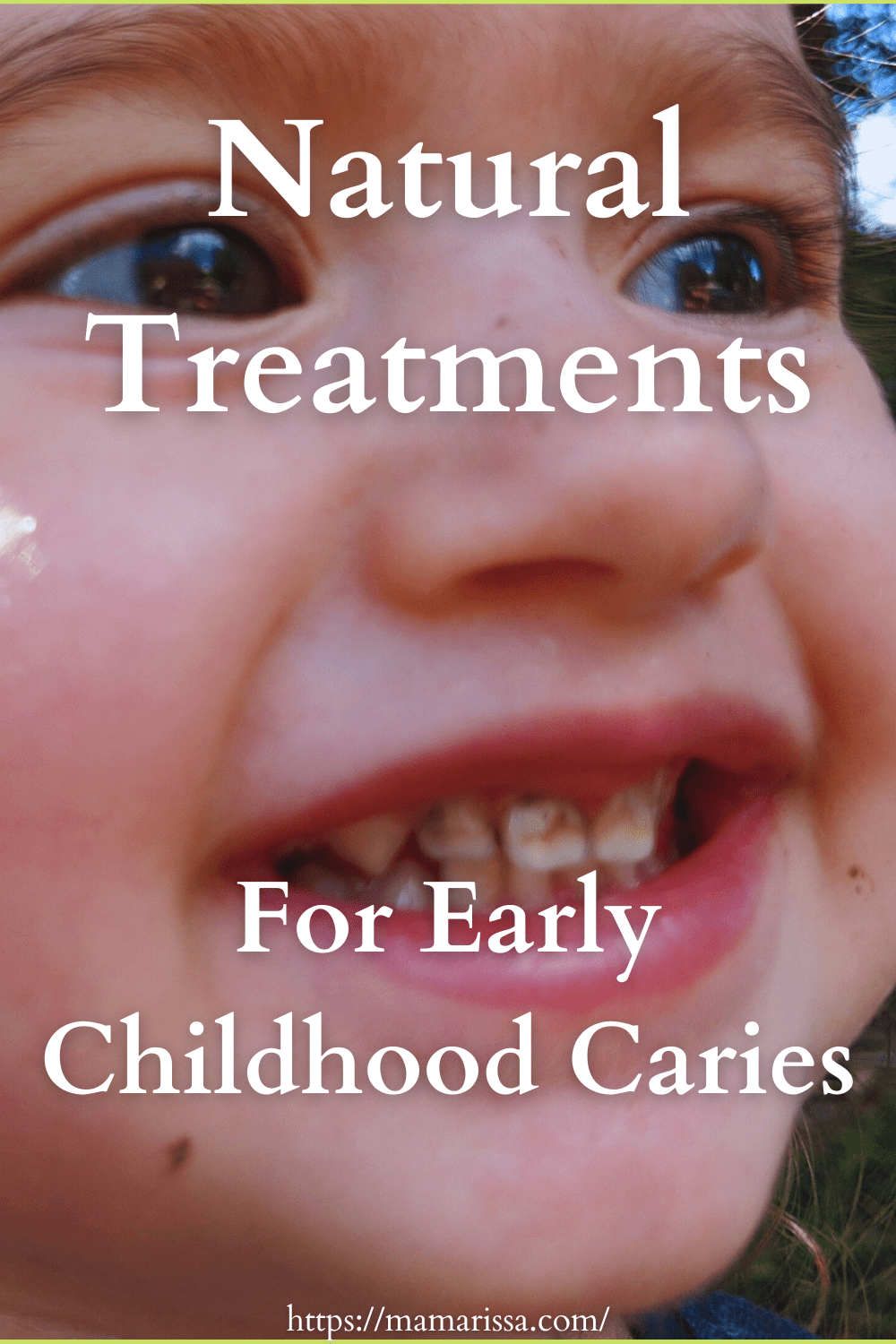
I get it. That’s where I was two and a half months ago too.
It’s a hard pill to swallow, accepting that your child’s teeth are rotting. The treatment options are scary. But left untreated, he will prematurely lose his teeth, which will quite possibly be a painful process.
So you are trying to figure out if it is realistic to try to naturally heal your child’s teeth. And you are wondering if there are effective natural treatments for ECC.
Well, Mama, I just saw for myself a week and a half ago that, yes, there are truly effective natural treatments for ECC! As discouraged as I was two and a half months ago, I am now confident and excited about my daughter’s oral health progress.
And I want to share some information with you today that will encourage you to hope for positive outcomes. You need only to be willing to make some changes and put the effort into these natural treatments for ECC.
But first, let me share what my two-year-old daughter’s oral health was like when I initially discovered her decay. And then I’ll reveal the good news of where she’s at today.
If you missed my first post on the topic of early childhood tooth decay, check that out here. This post will elaborate on the treatment plan I was just beginning when I wrote my original post.
DISCLAIMER: Please note that I am not a dental or medical professional and nothing in this post is meant to replace professional advice. Any practices or products suggested on Mama Rissa are meant only as the recommendation of a mom. It is the obligation of the reader to do his or her own research and speak with a doctor or dentist about any practices or products suggested on this website.
Hey Mama, if you find my blog posts helpful, would you help support this blog by making product purchases through the links on this page? It will not cost you any extra but the commissions I make as an Amazon and brand affiliate help to cover the costs of operating this blog so that I can keep it running ad-free. Thank you so much for your support. You are literally the reason this blog was started and the fuel that motivates me to keep it going!
Scroll halfway down this post for a discount on the ozone oil that stopped my daughter’s decay!
The Arrest of My Toddler’s ECC
Discovering the Decay
It was a devestating, horrifying day for me when I noticed white and brown spots on my daughter’s well-hidden top teeth. Her lip effectively covers the top half of her upper incisor teeth, so I had never really seen them when she smiled.
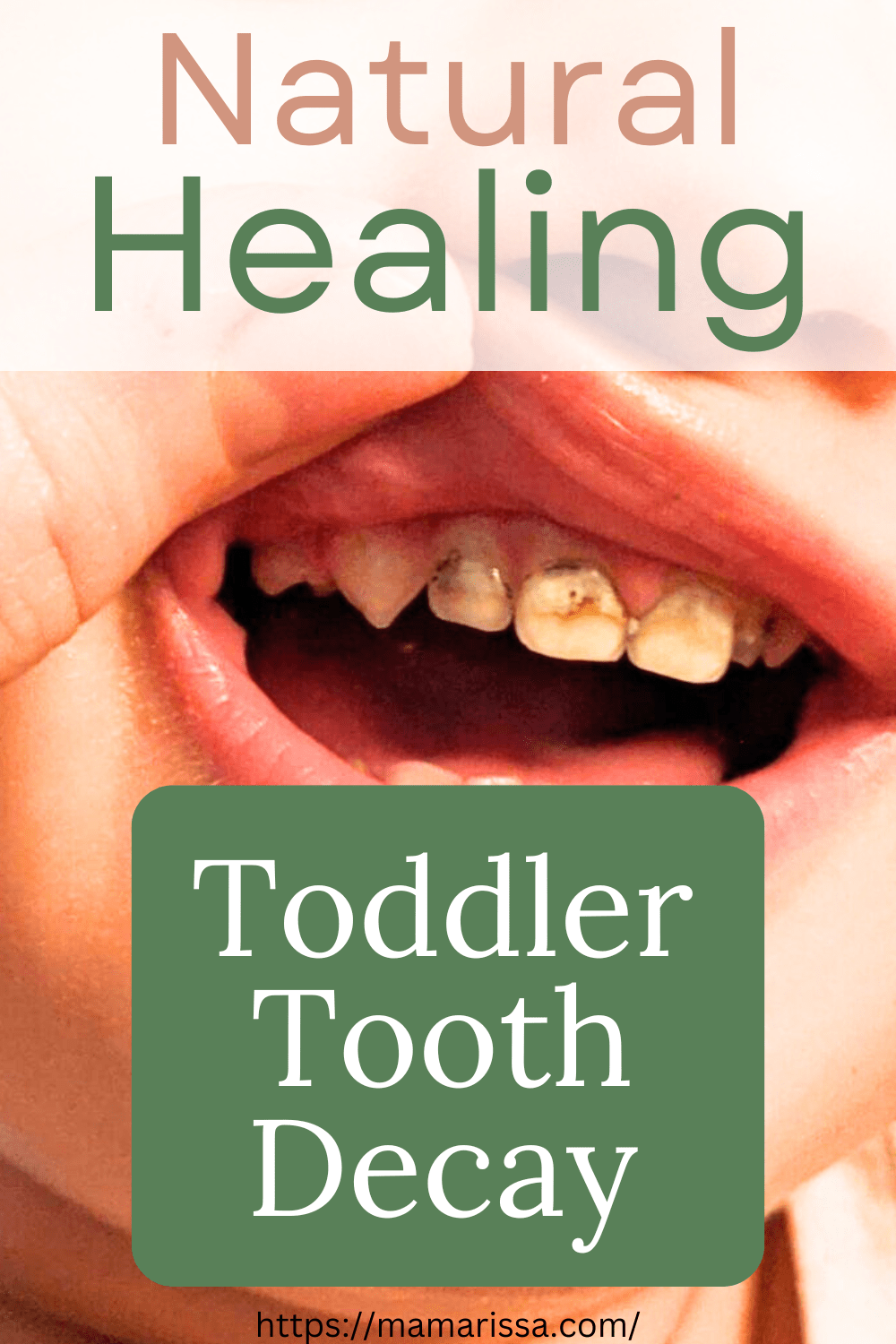
And as for brushing? Well, as is typical with most wiggly and unwilling toddlers, my daughter gave me limited time to stick the toothbrush in her mouth, move it around in a brushing motion and hope for the best.
I never, in my wildest dreams, expected my healthy-eating, water- and breastmilk-drinking two-year old to have a tooth decay probelm. But it was pretty undeniable that the chalky white extending down from her gumline and coliding with a brown line about halfway down was probably decay.
Initially, frantic though I felt to stop the progression, I was hopeful that it wasn’t too late to reverse or at least halt the decay if we got her into the dentist for treatment.
When I came home from our local pediatric dentist with the prognosis that my daughter needed several fillings and crowns, I was horrified all over again.
A couple of weeks later found me sitting in a new dentist’s office – which we had driven three hours to get to in hopes of finding natural treatments for ECC – trying not to cry. I was heartbroken as I stared at a picture of the back of my daughter’s upper incisors taunting me from a giant screen.
I texted my husband (who had to wait in the car) that her teeth looked horrible and were worse than we thought. At that point, it appeared to me that her teeth had worn away so much that the inside was exposed.
The dentist later explained that it was simply inflamation in her gums making them so red and painful-looking. Although, he did find a decay spot/cavity on one of her molars that was worn down close to the nerve.
The most telling and fascinating part of the appointment was when they examined a sample of her plaque under a microscope to see what kind of bacteria were present and active. What they discovered primarily was an overgrowth of candida which was helping the less prevelent decay-causing bugs eat away my daughter’s teeth.
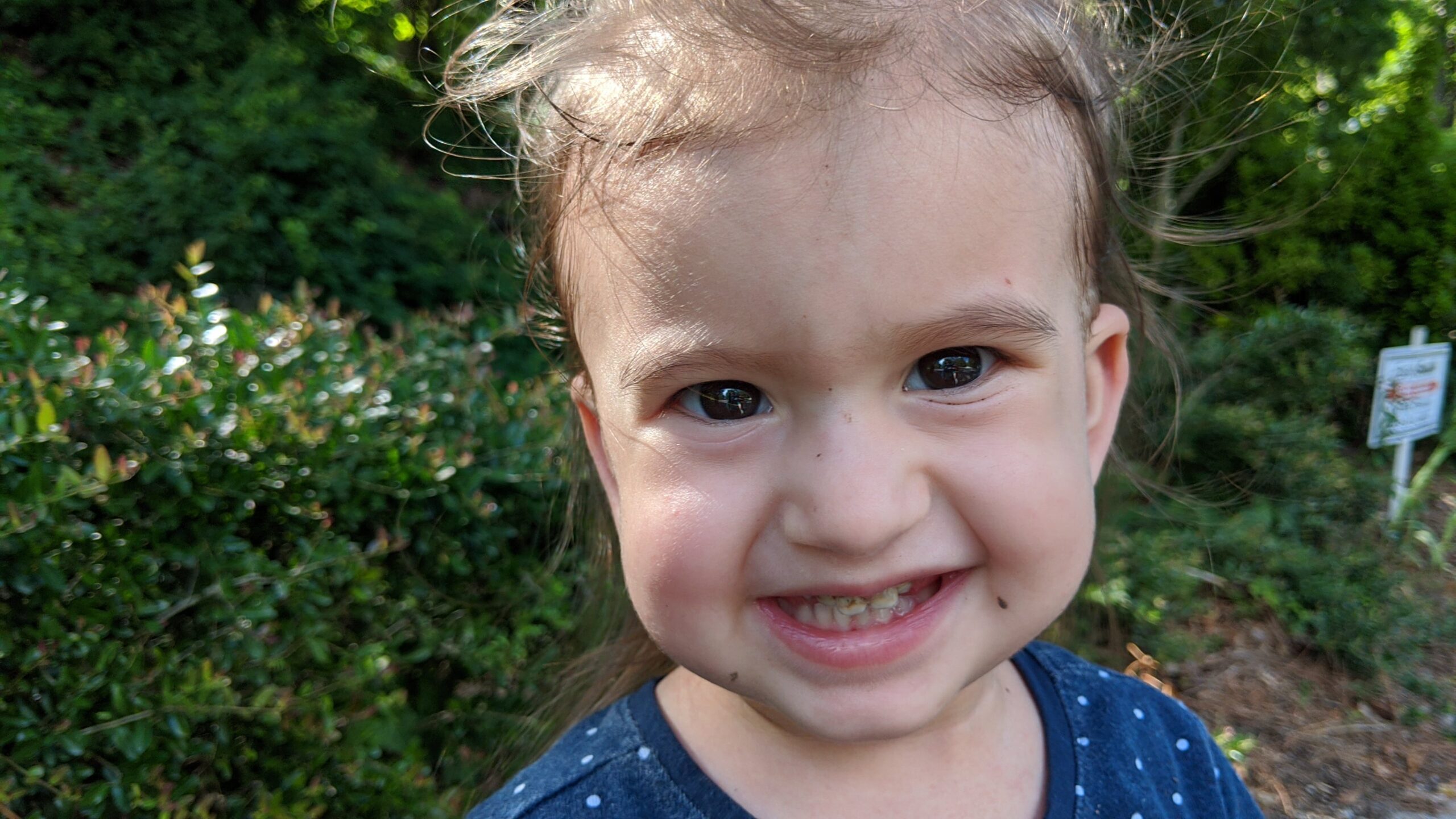
This was really eye-opening and led to a lot of googling – which began while I was still in the dentist’s office.
When the dentist fully examined her teeth, he discovered her decay spots were hard, not soft – which was a good thing. He also told me most of the brown and black on her teeth appeared to be staining. This was all good news!
The dentist discussed the natural treatment plan with me. He gave me hope that we might be able to slow or stall the progress of her decay enough to delay the need for crowns and fillings necessitationg general anesthesia, at least until she was a little older.
We’ll get to the natural treatments for ECC shortly. But first, let me give you our results to spark some hope in your heart.
Seeing the Healing
Since our first appointment and natural treatment two and a half months ago, my husband and I have been anxiously keeping an eye on our daughter’s teeth and waiting for her next appointment.
We had initially worried that her teeth would start wearing away or chipping, but we had not seen any signs of that. In fact, as far as we could see, nothing appeard to have negatively progressed or changed.
This was a welcome relief since, in the beginning, her teeth appeared to rapidly worsen from the time we discovered the decay to her first natural treatment.
I had even gotten a look at the gumline at the back of her upper incisors and it was now a normal, healthy pink color.
So we dared to hope that her tooth health was improving as we made the three-hour trip south for her recheck and second natural treatment.
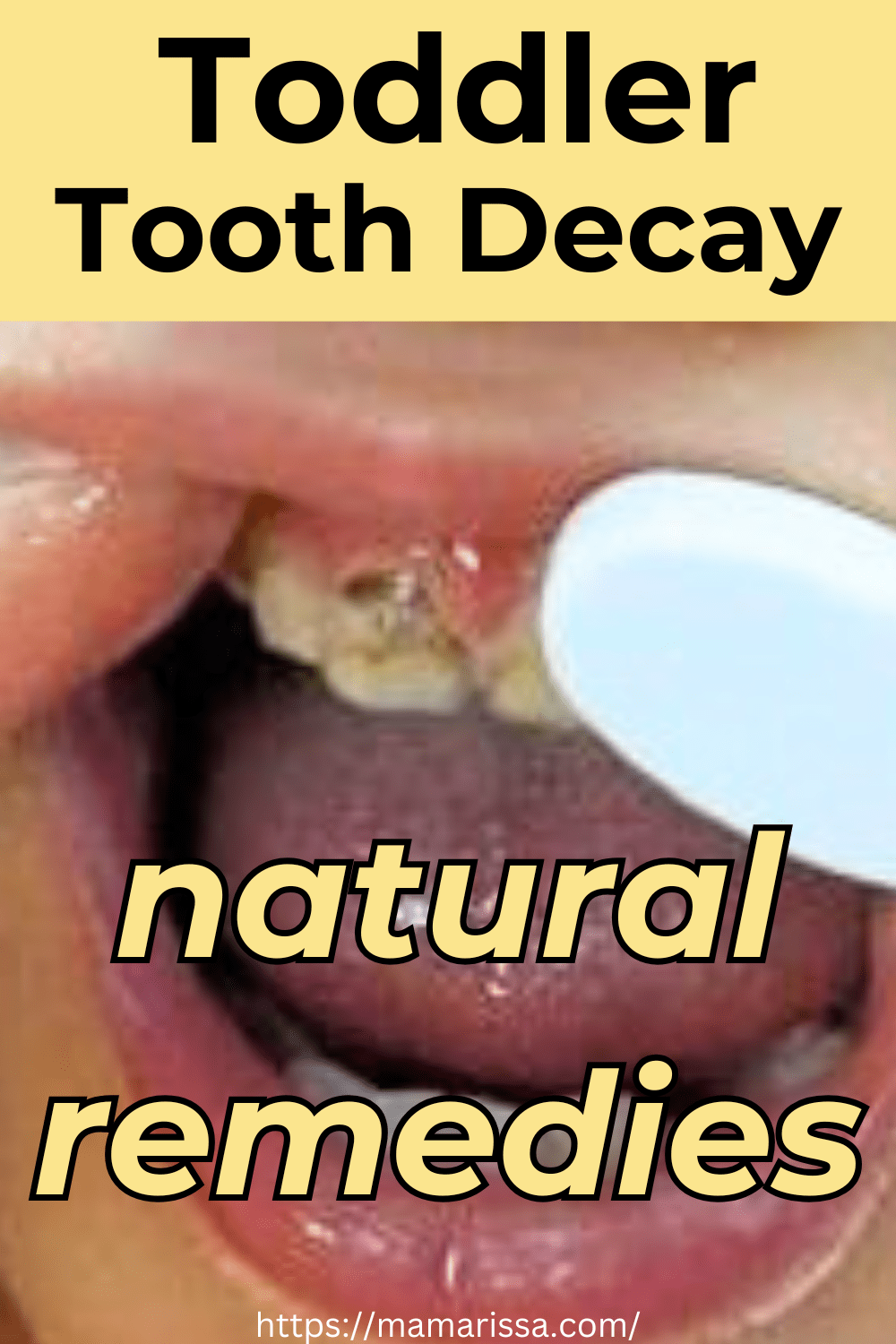
As I sat in the dentist chair holding my daughter on my lap, I eagerly watched the screen where the microscopic results of her plaque would be displayed.
As soon as the microscope zoomed in and focused, I could see for myself the unbelievable difference. Virtually no candida or other decay-causing bugs present! And, as the hygienist pointed out, possibly even some good bacteria!
Amazing. Once again, I was trying not to cry in this dental office but for the exact opposite reason this time around. My daughter’s teeth were healing!
Her mouth bacteria, according to the hygienist, now looks exactly the same as a perfectly healthy, cavity-free mouth. Which means there are no longer any bugs eating away at her teeth. Her tooth decay has been stopped. Halted. Arrested. Ended.
Thank you, God! I cannot fully express my joy and thankfulness over this change. For my husband and I, the biggest relief is that she will not need a major medical intervention that could effect her developing brain in order to keep her teeth. Nor will she have to go through a painful process of letting her teeth rot and fall out.
So, Mama, are you feeling hopeful yet? Do you believe it is possible to find natural treatments for ECC? I assure you, it is. Let’s talk about how …
What We Did
Your story may be different than ours and your child’s tooth decay may be at a different level than mine. I certainly cannot guarentee what results each individual child will have from practicing the following natural treatments for ECC.
But I do believe every child can benefit at least to some extent from these natural treatments for ECC. Even if your child’s teeth are already breaking or she already needs or has crowns, improving her oral health is important to maintain whatever state her teeth are currently in and prevent continued decay.
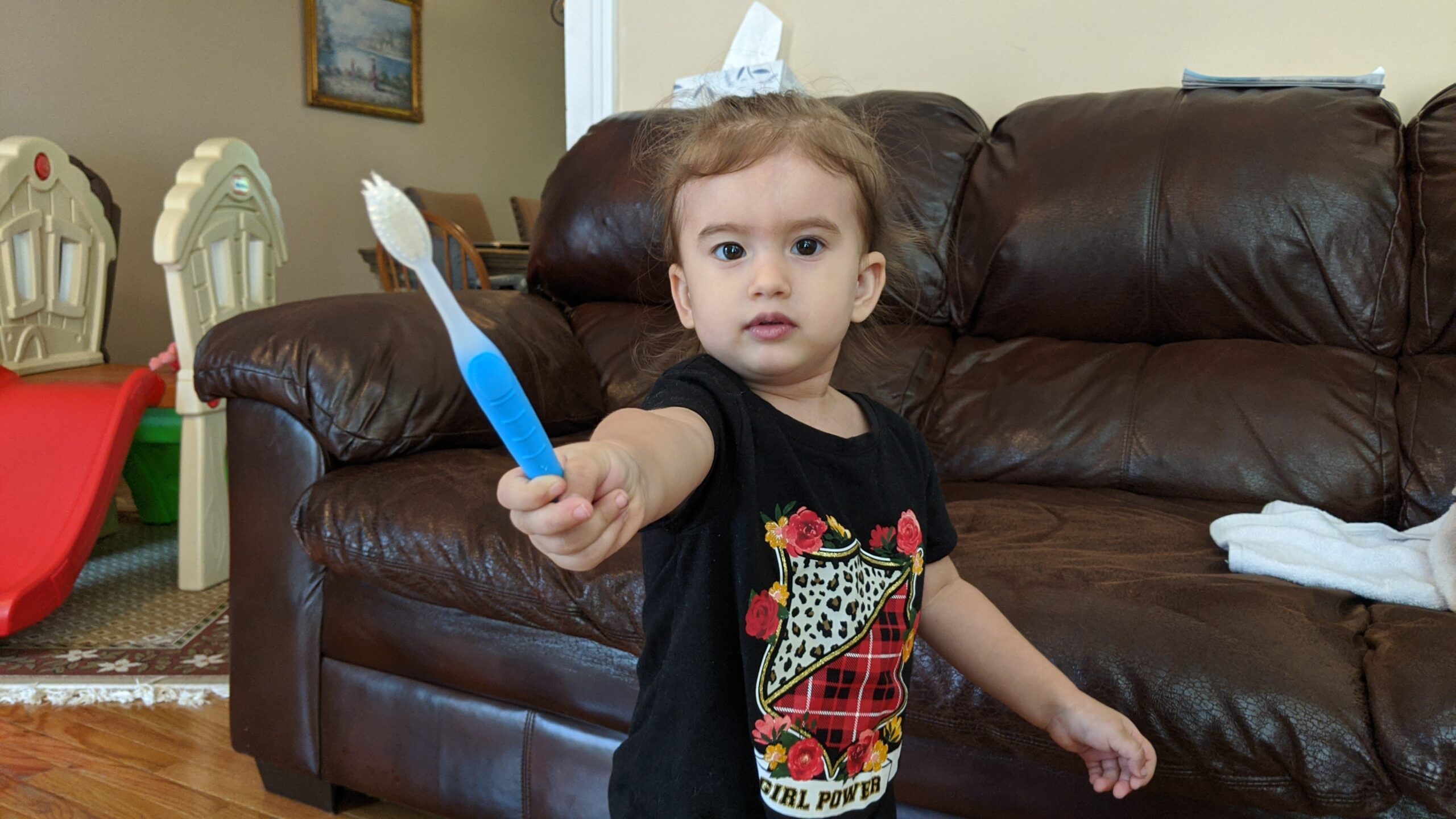
Here’s what we did whole-heartedly to stop the progression of my toddler’s tooth decay:
1. Brushed Thoroughly
No more of that hope-for-the-best brushing. At this point, I considered tooth brushing a medical necessity and was willing to do whatever it took to thoroughly brush my daughter’s teeth every morning and every night.
This meant that when the distractions, songs, stories and giggles didn’t work, I was willing to push through the crying until every last tooth was brushed.
Fortunately, my daughter is very good at adjusting to necessary changes and understands when we explain why we must do something. So she learned relatively quickly to open her mouth wide for mommy to brush once she realized it wasn’t optional.
I also peel back her upper and lower lips while brushing her front teeth. This is especially important for children like her who’s teeth tend to hide behind their lips even when they are smiling.
I do not use any special, fancy toothbrush. I bought these Colgate kids extra soft toothbrushes because they were reasonably priced, had good reviews and had cars on them – my daughter’s obsession.
2. Used Remineralizing Toothpaste
I started off using this toothpaste by Happy (not Happy Teeth – this is a different brand). I love that the website lists every single ingredient they use along with it’s purpose and where it comes from – most ingredients are from from somewhere in the U.S. with a few from New Zealand.
I also love the story behind how this company was started. Tom Carbone created his remineralizing natural tooth products as a result of his health-conscious daughter discovering her kids had cavities.
I can relate to that and I trust someone with personal experience and a desire to come back to nature with health care products.
I really love this toothpaste. It takes some getting used to at first because it is more runny than regular toothpaste. It does not foam up like your typical toothpaste and it does not leave a strong (if any) aftertaste. It leaves your teeth feeling like they have been cleaned without leaving chemicals behind.
I ordered the smaller 2.8 oz bottle to start and it has lasted around two and a half months. I have been using a pea size amount on my daughter’s toothbrush once a day with me also using it occasionally. I have the cinnamon flavor and my daughter likes it better than her other toothpaste (mentioned below).
I also appreciate that they offer free shipping within the U.S. as of this writing.
Update 4/10/2024: Currently, there is a $20 minimum purchase requirement to get free shipping.
(If you place an order for this truly amazing natural toothpaste, I sure would appreciate the discount I get on my next purchase if you use my name – Marissa Khosh – as your referral source.)
Edit 4/10/2024: I currently receive free product as a result of referring so many readers to purchase Happy toothpaste. However, I continue to recommend this toothpaste not because of the free or discounted products I receive, but because my daughter’s teeth have visibly improved over the course of the past four years of using this toothpaste. Read about the best dental report she’s ever received at her recent dental exam here.
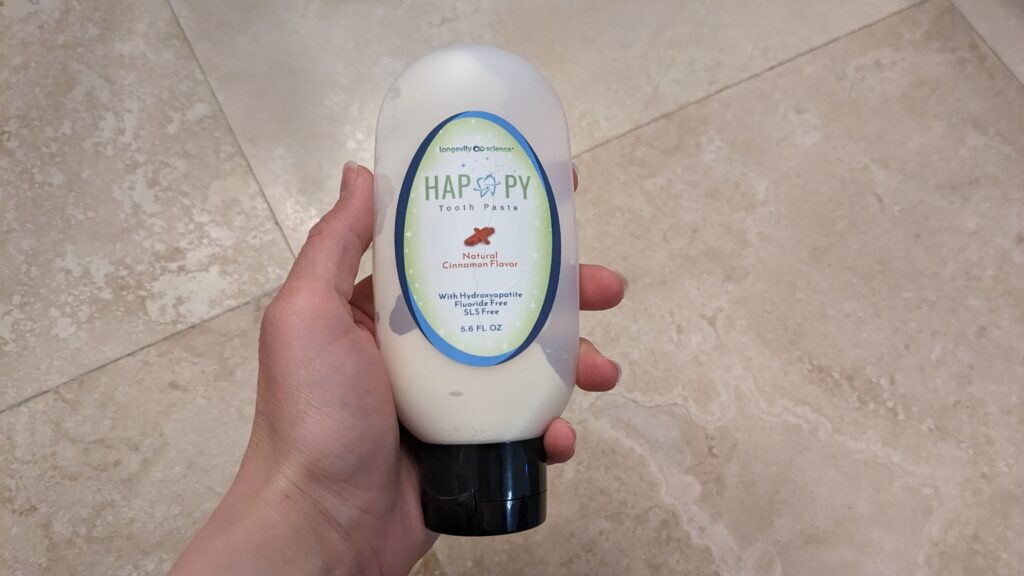
Additionally, I use this CariFree CTx3 gel in the evenings at the recommendation of the dentist. It is also remineralizing and can be ordered flouride-free (which is what her dentist recommends).
This toothpaste can be used morning and evening; I choose to use it only in the evenings because I like the Happy toothpaste so well and want to keep using that in the mornings.
Edit 4/10/2024: I eventually stopped using the Cari-Free CTx3 gel altogether in favor of the Happy toothpaste. There was nothing wrong with the Cari-Free and I have no reason to dissuade anyone from using it. I just personally felt that the Happy toothpaste was superior in its cleaning abilities and the purity of its ingredients.
3. Switched to a Biodentist
The dentist I keep mentioning who is administering natural treatments for ECC on my daughter is a biodentist. You might also find a holistic dentist who has similar views.
A biodentist or holistic dentist is a dentist who looks at the whole person to find the root causes of symptoms and addresses those root causes.
So, for example, when I took my daughter to a traditional dentist, they wanted to “treat” the symptom of rotting teeth by getting the rotting parts off of her teeth and putting something artificial on instead.
But even the hygienist at that dentist warned me to put her on reflux medication (something I will not do) to prevent her ongoing reflux from eroding the new, fake teeth.
Find out why I refuse to medicate my daughter’s acid reflux here.
Clearly this was a short-term fix.
By contrast, the biodentist wanted to know what type of bacteria specifically was causing the decay. And finding out that she has a candida overgrowth enlightened us to the possibility that this may also be what is causing her reflux.
The biodentist also talked to me about diet changes (discussed below) that the traditional dentist never even mentioned.
4. Started Ozone Treatments
One of the natural treatments for ECC that we are using to improve my daughter’s oral health is ozone treatments at the biodentist.
Although there are other forms of it, my daughter’s ozone treatments consist of a gas administered directly to her teeth with a syringe. The ozone penetrates biofilms and kills bacteria, viruses and fungus. It also alters the pH in the mouth making it less acidic and less friendly to decay bacteria.
My daughter’s treatments are every 2-3 months for a total of 4 treatments. I’m truly amazed by the results of this treatment even after one dose.
However, as the dentist and hygienist emphasized to me, the ozone treatment is most effective paired with diet changes that starve the bacteria and, in my daughter’s case, the candida.
Edit 4/6/2024: After visiting the bio dentist for a year and a half, we moved to a new state and had to find a new option for ozone treatments. We ended up using this blue jar of PurO3 ozonated olive oil to protect my daughter’s teeth from decay and sensitivity. It was incredibly helpful and effective. It is also a much more economical way to administer ozone treatments.
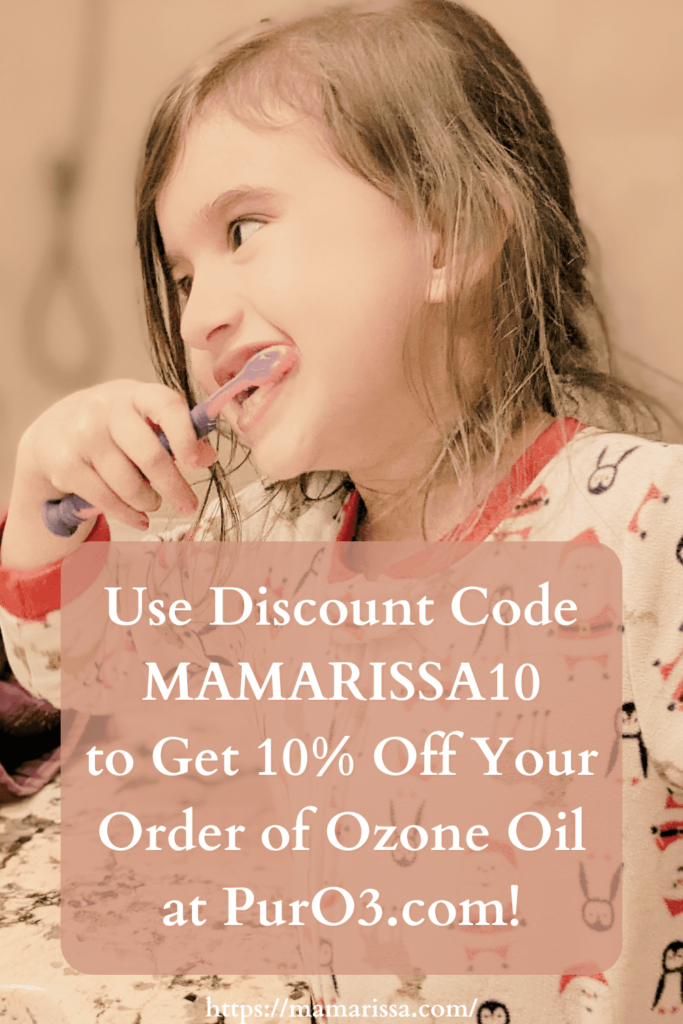
5. Reduced Phytic Acid
Before we went to the biodentist, my research led me to the discovery that most of us – even those of us that think we are eating healthy – are eating grains, legumes, nuts and seeds in a way that actually sucks the nutrients from our bodies.
Phytic acid is an anti-nutrient present in certain plants for the purpose of preserving their seeds until they can plant, sprout and grow. Unfortunately, that also means the nutrients they can potentially provide to our bodies are locked away and are undigestable for many people, causing bloating and digistive discomfort.
Additionally, phytic acid binds to nutrients already present in our bodies, creating a nutrient deficiency of calcium and vitamin D among others.
With nutrients lacking from the body, the teeth are bound to be lacking as well which makes them weaker and more susceptible to decay.
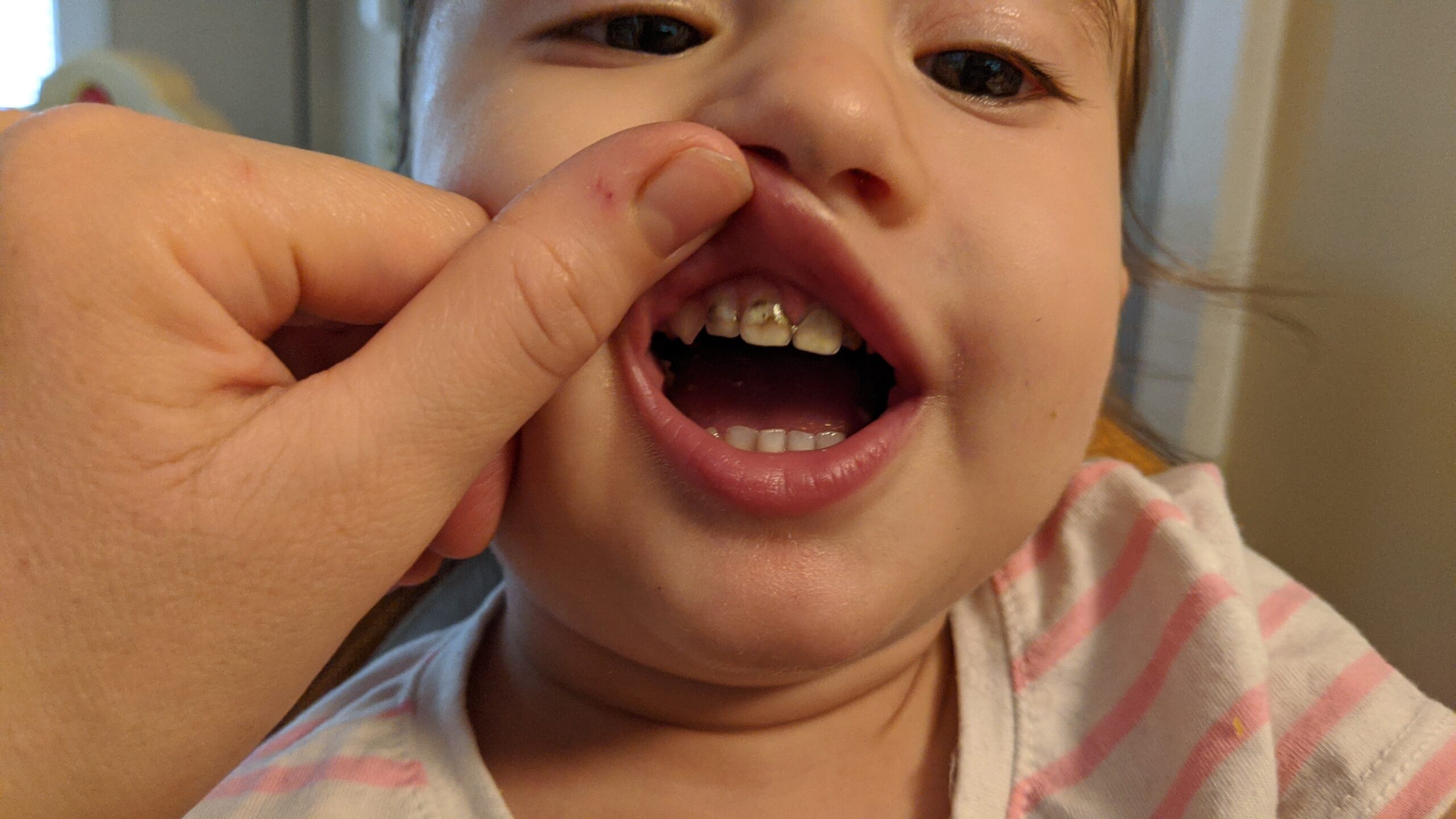
Reducing phytic acid involves soaking, sprouting or fermenting foods that are high in phytic acid. The most simple option is to soak, so that is what I do with our grains, legumes, nuts and seeds as often as I can.
Mark Burhenne, DDS at Ask the Dentist explains phytic acid in more detail in this article.
For more info on how to soak, sprout and ferment, check out Weed ’em & Reap.
6. Increased Nutrients Through Food
In addition to removing anti-nutrients, I also began adding extra nutrients into our diet in an effort to give my daughter’s teeth what they needed to get and stay healthy.
The main way I did this was by making organic bone broth and adding it to our meals. You can also buy powdered bone broth but I have no experience with this.
I won’t go into the extensive benefits of bone broth here, but it is a powerful way to increase nutrients in the body and treat numerous conditions.
Take a look at this thorough article on the benefits of bone broth by Chris Kresser for more in-depth info on that.
I will say, you have to really be in the mood for bone broth to be appealing as a drink. Hence, in a cup is not an ideal way to serve this superfood to a toddler.
I have learned to put bone broth in a variety of savory foods where it adds delicious flavor and is tolerable to my daughter’s little taste buds.
(By the way, bone broth is super easy to make! Especially if you have an Instant Pot like this one.)
We have also been eating boatloads of yogurt to store up good bacteria in my daughter’s body. (The Instant Pot also makes yogurt-making super easy – as in, I spend 5 minutes to make a gallon of yogurt.)
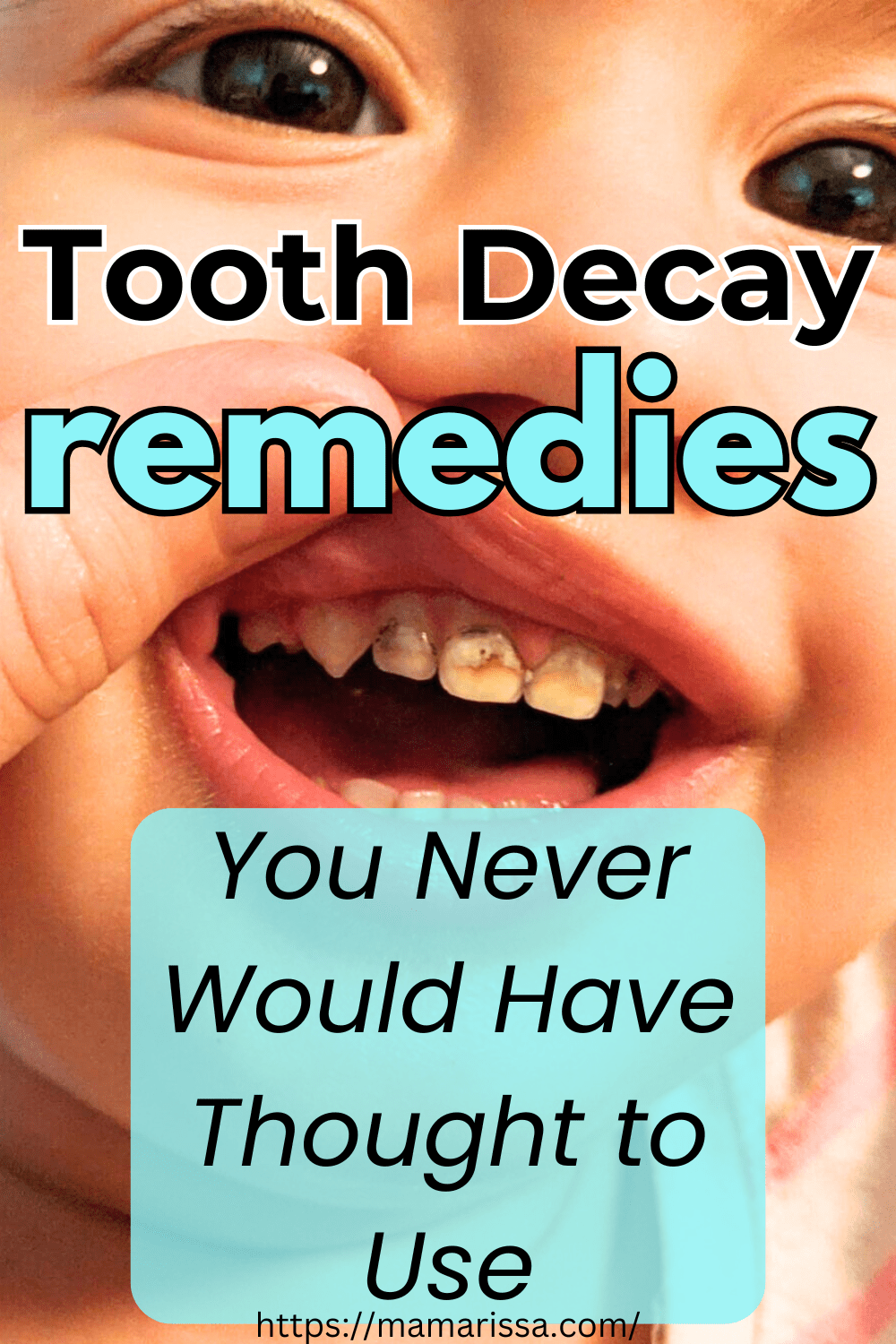
Increasing nutrient-rich foods is important for the same reason as reducing phytic acid. The teeth need nutrition to stay strong and healthy just like any other part of our bodies.
7. Went on a Bacteria-Destroying Diet
Once we discovered my daughter’s candida overgrowth, we immediately started her (and me, since she’s still breastfeeding) on an anti-candida diet – also known simply as the candida diet.
The candida diet is a very low carb diet designed to starve the candida so that they die off.
Candida feed on carbs, sugars and an acidic environment. Candida can also be worsened by aged and high-mold foods or funguses because candida is a yeast.
Additionally, antibiotics are a major cause of candida because they kill the good bacteria that keep the candida in check. This is very likely the cause of my daughter’s candida overgrowth since I had numerous doses of antibiotics during my long labor with her.
Read my birth story here!
On the candida diet, a lot of foods need to be eliminated including all processed food, high sugar fruits and vegetables, all grains, inflamatory foods like lagumes, most dairy, any antibiotic-treated animal or fish meat, and any foods containing yeast, fungus or mold.
It is also important to limit low-sugar fruits to 2 servings per day.
Conversly, eating bacteria killing foods is great on the candida diet. My favorite natural treatment for virutally every illness is raw garlic, so I try to incorporate that into at least one meal every day.
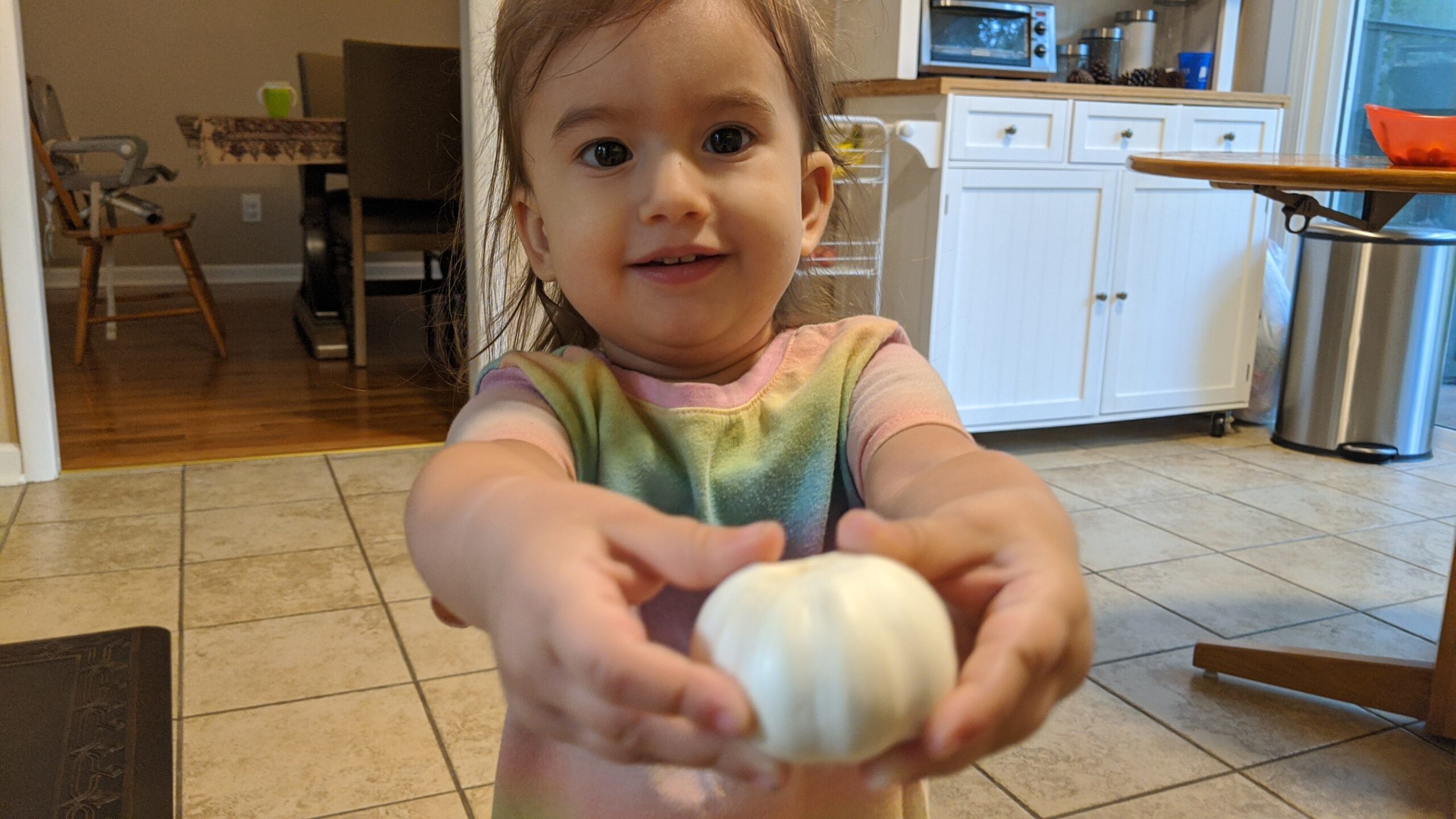
This is a bit of a tricky diet because you will find conflicting information on the internet about what you can and cannot eat on the candida diet. I just read the info on several different websites and did my best to eliminate as much as I could.
In addition to following the candida diet, there are a couple of carb rules the dentist gave us to live by:
- Eat carbs/sugars with meals/protein.
- Limit carb/sugar exposure to no more than 3 times per day
Get my FREE list of easy, low-carb, sugar-free snack ideas by entering your email at the bottom of this page!
As the dentist explained, continuous blood sugar spikes are what allow bugs and bacteria to thrive because they are constantly being fed.
Regardless of how many or few carbs your child takes in, they should only be eaten 2-3 times per day, not throughout the day. And they should always be paired with meals or at least some protein to help regulate the blood sugar spike.
8. Started Vitamins
As admirable as it is to try to get all nutrients from eating healthy whole foods, if your child has tooth decay, he probably needs some additional help. He may need some supplementary vitamins.
I found these Nature Plus Animal Parade Tooth Fairy vitamins that have vitamin D, Calcium, xylitol, S. salivarius M18, and L. acidophilus to support children’s tooth health. They are sweetened with xylitol and date and fig concentrate.
My daughter loves them and asks for them more often than she is allowed to have them. These are hard so they are only appropriate if your child is old enough to easily chew.
The only thing these vitamins don’t have that is essential for tooth health is vitamin K2. K2 is necessary to help the body absorb vitamin D, so I ordered Mary Ruth’s Organic Vitamin K2 liquid drops to give my daughter as well.
This is basically a bottle of olive oil with vitamin K2 in it and it has a dropper lid. Just add it to your child’s food and she’ll never even know it’s there.
Update 6/8/2023: I no longer recommend the Mary Ruth’s brand of vitamin K2, because I have recently seen a lot of negative reviews regarding quality problems with one of their other liquid vitamin products. Instead, I would recommend either Child Life New! Organic Vitamin K2 or Carlson – Kid’s Super Daily K2. Please always pay attention to dosing instructions for your child’s age.
The ChildLife vitamin K2 has dosing instructions for infants up to age 4+. Dosing info and ingredients can be found on IHerb. This one is flavored, so it may be harder to hide in a drink or food.
The Carlson vitamin K2 states it is for age 4 and up. I am guessing this is because it is a slightly higher dose. I like that a dose of this one is only one drop, but that also means it cannot be adjusted to a smaller dose. Please consult with your child’s pediatrician on whether this dose would be safe for your child depending on her age.
What We Did Not Do
1. Stop Breastfeeding
On the way home from our first appointment with the biodentist two and a half months ago, my husband and I decided it was necessary that I stop nursing my daughter to sleep. Our reasoning for this was to reduce her exposure to sugar for the reasons mentioned above.
She has always nursed to sleep and back to sleep frequently throughout the night and for her nap. This means her 2-3 sugar/carb exposures per day were already being greatly exceeded by breastfeeding alone.
My daughter showed no indication of being ready for night weaning, but we were scared. We were trying to do everything in our power that might aid in saving her teeth.
Ultimately, my daughter was not capable of sleeping without nursing. We ended our efforts to avoid traumatizing her but worried about the effects on her teeth.
Read this post on why sleep training is not right for some children.
Two and a half months later, I am glad we were not able to get her to sleep without nursing for two reasons:
First, because it would have taken away my ability to meet a need that she obviously still has.
Second, we now know that breastfeeding to sleep did not cause her tooth decay.
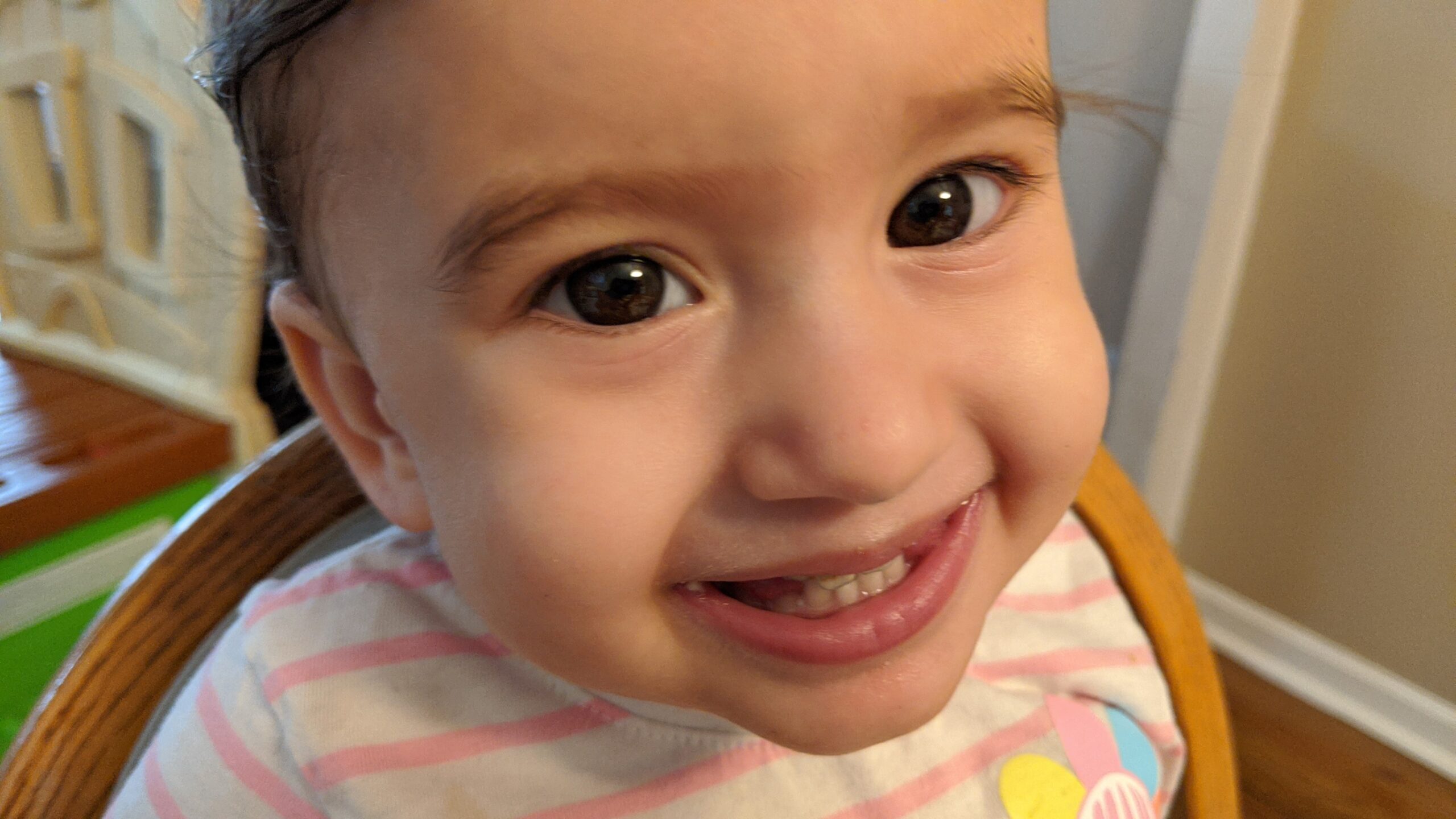
As a matter of fact, despite continuing to nurse to her heart’s content during sleep, the hygienist at the biodentist commented that my daughter’s oral improvements are among the best results she has ever seen.
Let that be an encouragement to you if you are breastfeeding to sleep, Mama.
2. Get Fillings, Crowns, etc.
My daughter’s story could have been so different. I could have taken the advice of the first dentist she saw. We could have driven to a hospital, allowed anesthesia to be pumped into my toddler’s veins, and had her rotting teeth replaced or filled with man-made substitutes.
We could have needed to do that whole scenario over again after the teeth-eating bugs in her mouth destroyed the crowns and fillings along with her remaining natural teeth.
Despite this, we might have a perfectly happy and otherwise healthy child.
Or, consider our current outcome after using natural treatments for ECC. Not only are her teeth doing better. Not only did we not have to medicate her or add questionable materials to her mouth to heal her teeth.
But we may have even found the key that will ultimately unlock the mystery of her acid reflux.
So deciding to see the biodentist – as opposed to going the traditional route of fillings and crowns – has impacted her health in many areas of her body for the better.
Now, my point is not that no child should get crowns or fillings. For the child who has broken or worn down teeth, it may be necessary to artificially preserve his chewing capabilities. My point is simply to try to get to the root of the problem instead of putting a bandaid on the symptom.
Update 5/11/23: Last fall, 2 1/2 years after discovering the tooth decay, my daughter got crowns and fillings on the teeth that had been damaged beyond natural repair prior to the discovery of her decay. Although her decay was still arrested and some of it had even improved, a terrible Covid-induced reflux flare-up was making her cavitated teeth very sensitive, so we went ahead and got the work done.. Read the full update in this post.
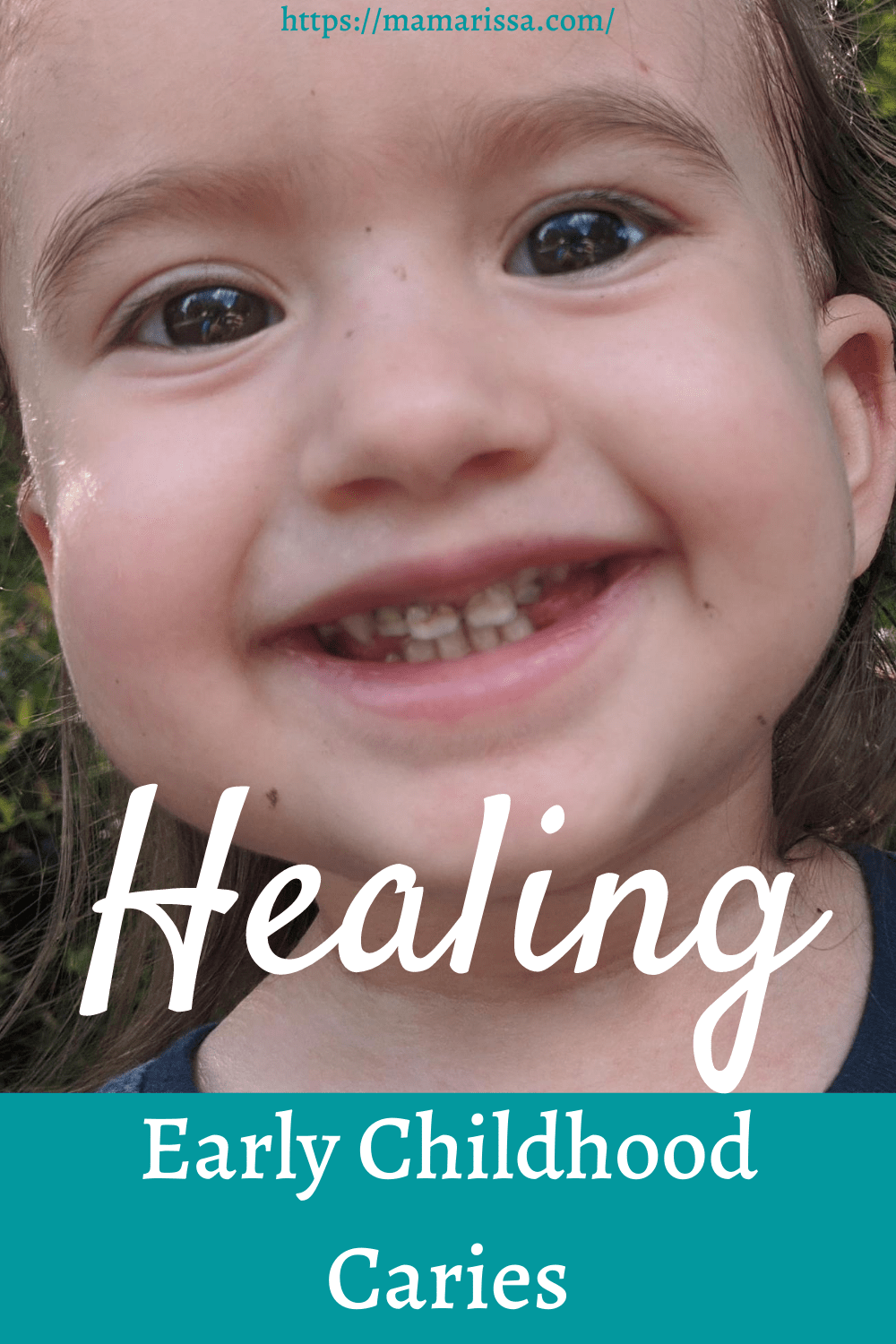
3. Use Flouride
When we first found out my daughter had tooth decay, I assumed she needed a flouridated toothpaste ASAP to fight it off. But then I started reading online natural sources about how toxic flouride is.
I was also stressed over the fact that my daughter could not master spitting out the flouridated kids toothpaste I had rushed to Walmart to purchase. Every time we brushed her teeth, the “DO NOT SWALLOW” label on the tube flashed in my mind’s eye as my daughter gulped down the foamy liquid in her mouth.
So I ended up searching for and purchasing a safe-to-swallow toothpaste (the Happy brand previously mentioned) as one of our natural treatments for ECC.
As you can see by our positive results, flouride was not needed in order to fight my toddler’s tooth decay. However, some cases may be severe enough to warrant the use of flouride. Do your own research and consult a natural dentist to figure out what is best for your child.
4. “Cheat”
Everyone cheats on strict diets, don’t they? It’s almost impossible not to when you feel deprived. And it’s not easy to continually say no to your innocent little toddler who just wants to eat a date.
Just the same, we did not cheat at all that first month of our candida diet. I was taking these natural treatments for ECC seriously because of the fear of what could happen if we did not succeed.
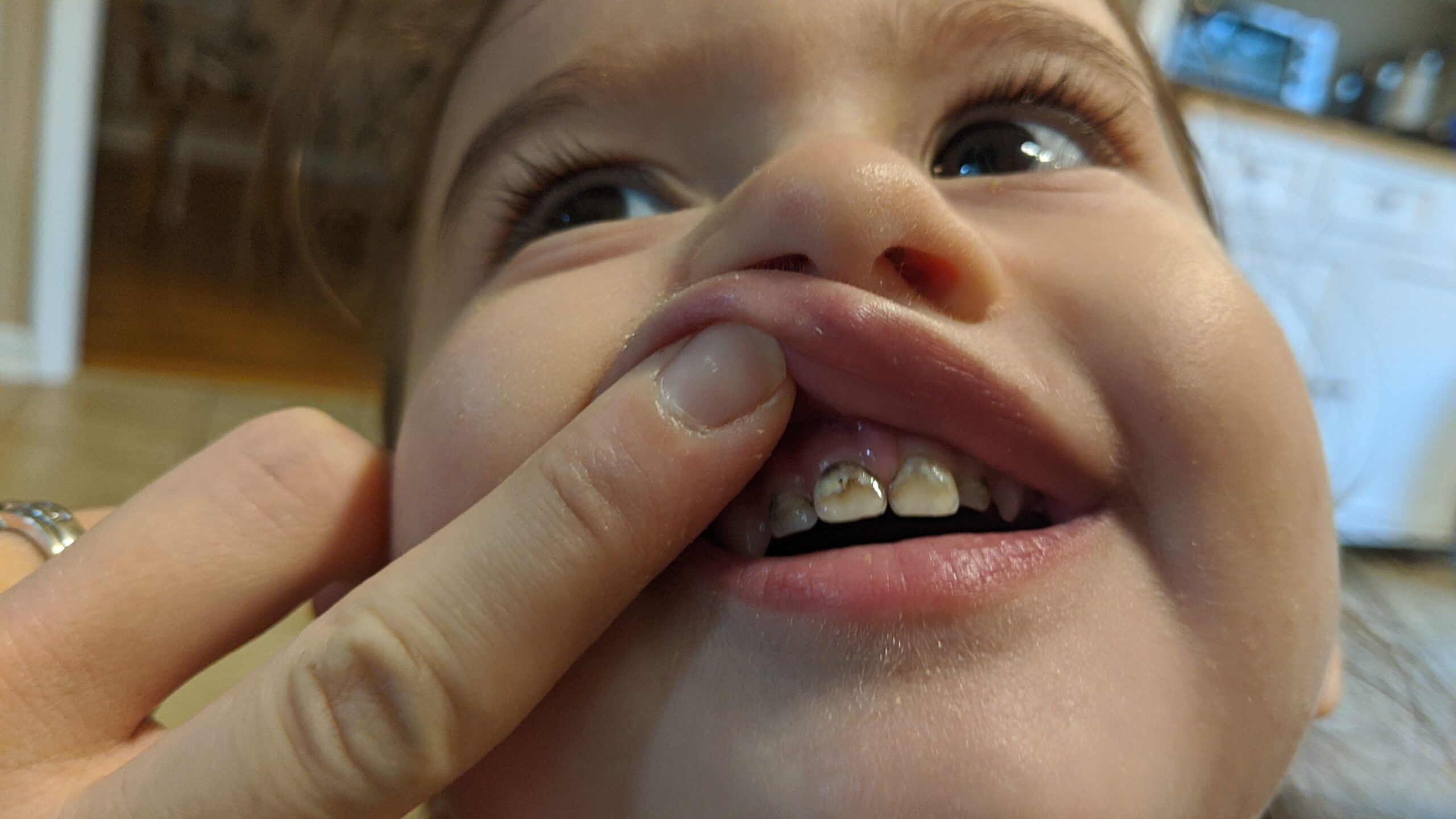
Since that first month, we have let up a teeny tiny bit. I still don’t give my daughter cheat foods regularly or even once a week.
We have very rare occasions when she gets something special, like a piece of bread (one of her favorite foods) or the bluebery muffin Larabar she got as a celebration after her recent biodentist recheck.
Although it is not a regular thing for me to give her big no-no foods, occassionally we have the “maybe” foods in moderation now that things seem to be under control – like a small piece of 85% dark chocolate or a small bowl of homemade, GMO-free pop-corn.
I know it’s difficult, but you can’t allow your guilt over “depriving” your child to overrule what you know will ultimately be best for his health. As hard as it is to tell my daughter we can’t eat french fries with supper like Daddy, I know it would be a lot harder for all of us if she had to undergo a procedure.
Are Natural Treatments for ECC Worth a Try?
I know all of this sounds like a lot of work. And to be honest, it’s not cheap financially.
Natural toothpaste costs four or five times the price of regular toothpaste. Organic, antibiotic-free meat is two and a half times more than regular meat. Vitamins are pricey. And our biodentist does not accept insurance.
Using natural treatments for ECC will cost you in other ways too. It will require a commitment from you in many areas and you will have to adopt a new way of life indefinitely.
But is it worth it to stop a disease that is literally trying to eat a part of your child’s body? One hundred and ten percent! Because my daughter is living proof that natural treatments for ECC work!
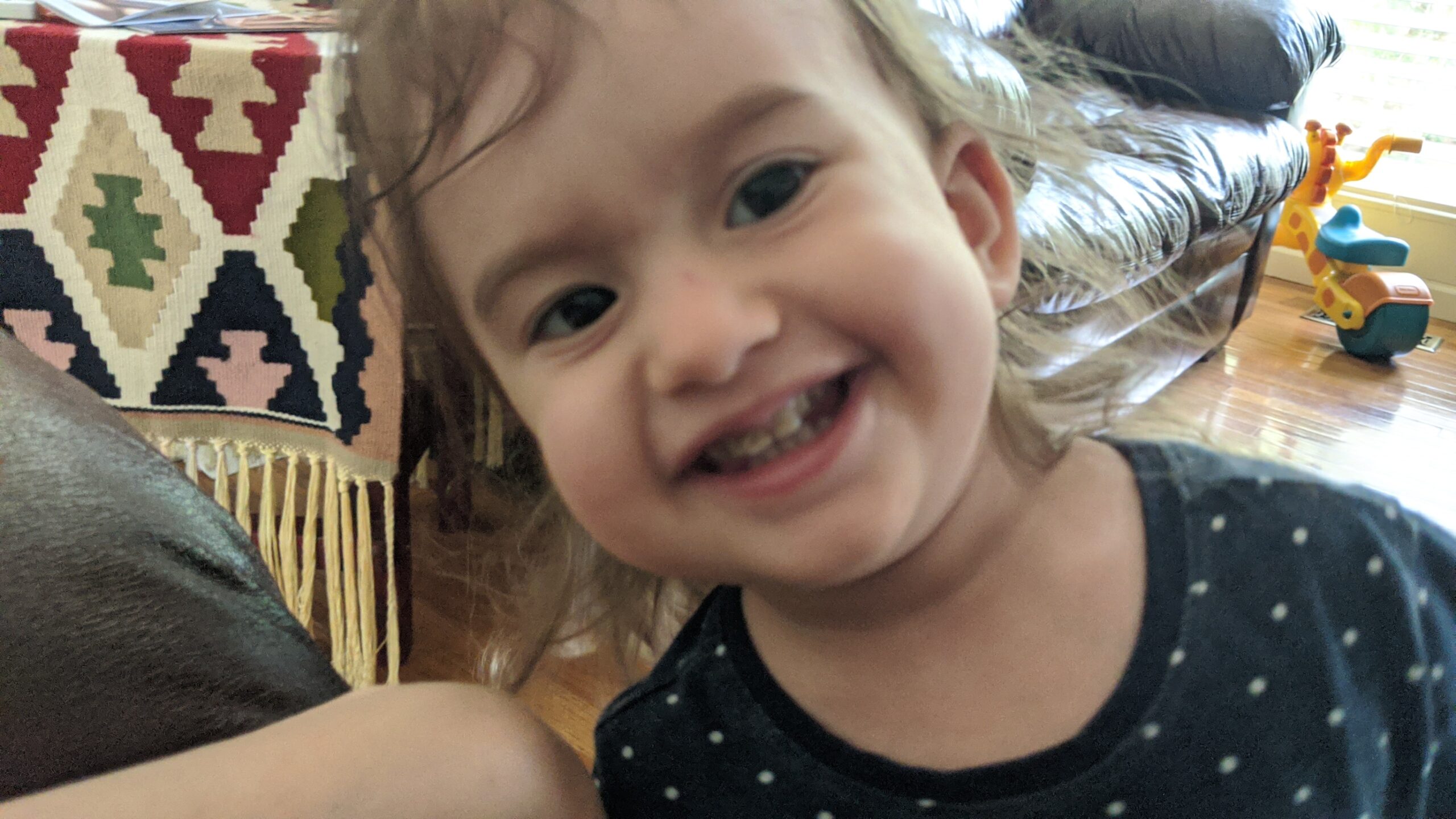
I may have regrets about decisions I made in the past that potentially caused my daughter’s tooth decay … but I don’t have a single regret about how I responded to it.
Need to unload your burden, Mama? Tell me your child’s tooth decay story. Send me an email or comment bellow. And then share this post with other mamas fighting for their child’s teeth!
Read more about childhood tooth Health in the following posts:
- Early Childhood Tooth Decay: Surprising Causes & Treatments
- Tooth Decay in Children: 3 Simple, Natural Treatments
- Healthy Candy for Kids with Tooth Decay
- Kids Dental Crowns – Are There Alternatives?
- Results of Natural Cavity Treatment in Kids
- Is Nano-Hydroxyapatite Safe? What You Need to Know About the Remineralizing Ingredient in Your Child’s Toothpaste
- Best Hydroxyapatite Kids Toothpaste Options
Need more support as you figure out this childhood tooth decay thing? Join my Facebook support group for parents of young children with tooth decay!


23 responses to “Natural Treatments for ECC (Early Childhood Caries)”
[…] you have a child with cavities you want to remineralize or you are simply looking for a better, healthier, fluoride-free kids toothpaste, you have come to […]
[…] Read about how our childhood tooth decay journey began here. […]
[…] Read more on our encouraging experience at this biodentist in the second post I wrote on my daughter’s tooth decay here. […]
[…] our childhood tooth decay journey and natural treatments at the beginning of discovering the decay, 3 months into natural treatments and 2 1/2 years into natural treatments when we did crowns and […]
[…] Natural Treatments for ECC (Early Childhood Caries) […]
[…] patients. I also recommend it in a couple of blog posts I wrote about early childhood tooth decay (https://mamarissa.com/natural-treatments-for-ecc-early-childhood-caries/). I want to get you as much business as I can because I need this toothpaste to always be available […]
This is encouraging; I hope we can halt my daughters tooth decay, definitely not something I anticipated or thought would be something we would have to work through. She’s 18 months and the dentist is recommending crowns, which will require general anesthesia. I’m hoping we can stop the decay and maybe postpone the crowns! There is a couple chips in her one tooth, I wish I knew more about how much decay is tolerable before the crowns are needed. I’m so worried about the anesthesia.
Kimberly,
I am sorry to hear about your daughter’s tooth decay. I know that is a painful discovery to make as a mom.
My experience with my daughter was similar, although she was around two when I discovered her decay and the dentist was recommending crowns. She is now 4 1/2 and we only just had a couple of crowns and couple of fillings put on last week because her cavities have been sensitive lately due to an intense reflux flare up she has been having recently. We knew we would eventually need to get the work done, but, like you, we did not want to put our two-year-old under anesthesia. And I am so glad we waited because in the meantime, we found natural ways to actually reverse some of the less severe decay and prevent further problems. And I was much less worried about her going under anesthesia at this age than I was when she was two.
However, none of my daughter’s teeth ever chipped, so I cannot speak to that part. I do know that if crowns are needed, they need to be put on before there is not enough tooth left to crown. I would highly recommend that you try to find a holistic or biological dentist to get a second opinion on the degree of her decay and how long the work can wait.
I also recommend you read my most recent post on our tooth decay journey (https://mamarissa.com/tooth-decay-in-children-3-simple-natural-treatments/). In it I have a link to an ozone oil that I use weekly on my daughter’s teeth to kill candida and whatever other harmful bacteria are on her teeth. I used to take her to a biodentist to get ozone treatments in gas form, but when we moved and no longer had access to a biodentist who would perform ozone treatments on children, I started looking for ways to administer ozone myself at home. All it is is ozonated olive oil and it is much cheaper than getting ozone treatments done at a biodentist.
I hope you are able to get some solid answers about what needs to be done when with your daughter’s teeth. Please let me know when you have an update!
[…] plan with my daughter, read this post that I wrote at the very beginning of our journey and this post I wrote a couple of months later as an […]
[…] Also, as a word of comfort, my daughter’s teeth are stable a year and a half later, even with continued nursing throughout the night for most of that time. For more details on what we did to accomplish that, check out this post. […]
[…] know that not everyone goes through tooth decay with their toddler. But for you, it has challenged your child’s entire diet and oral health, and you need […]
Thank you for posting this information. My son is 2 years old and has very bad front teeth. The first dentist said it was demineralization (we went twice). Then he suggested a pediatric location and we went there and she said that they are cavities and he would need to be put under but we would have to wait since he’s young and small (he’s in the 1% for weight. He’s a little guy). Because he is little, putting him under definitely worries me. I want to try to find a more natural dentist first and see what they say. Do you see improvement in your daughters teeth? Or is it something that is vaulted until they fall out?
I really do feel mom guilt for letting it get so bad.Justine,
I am sorry to hear you are going through this with your little guy. I completely understanding the overwhelming mom-guilt this brings on, but please try not to blame yourself. It was at the same age that I discovered my daughter’s decay and I felt so ashamed that I hadn’t noticed it sooner. But the reality is, with children that young, we barely get a glimpse into their mouths most of the time. They certainly don’t open up and curl back their lip for us to brush when they are that young.
My experience and understanding has been that, depending on the stage of decay, it may or may not be reversible, but at the very least, it can be stopped from progressing. My daughter’s oral health improved because her gums are no longer inflamed and painful. However, the scars of decay are not going to disappear from her teeth. But for me, the important thing is that we protect and preserve them as much as possible until she can have work done without being put to sleep and until it’s time for them to fall out. It’s been a year and a half for us and her teeth are still stable even though we have not had any work done. She has cavities, and I keep being told she will eventually need work done on them, but so far I have been assured that it is okay to wait as long as we prevent the cavities from getting worse, which is what we have been doing.
I cannot speak for your son’s specific situation of course, because it depends on the state of his teeth. I know that it is possible to actually reverse some decay with remineralizing care, but even the decay that is beyond reversal can at least be stopped so that it does not cause any further damage.
I hope you are able to find a good dentist to help you with this, although I also highly recommend you continue to do your own research (as you obviously have already been doing). Please update me!
Did you feel like there was a time period from when you started the remedies/diet changes/supplements before you started to see a difference? How long did it take for you to notice that things were getting better and what were the first signs that things were taking a turn?
Struggling mama here wading through this process and looking for some hope lol.Sienna,
I’m sorry to hear you are having this struggle as well. It is so hard to go through with your little one.
To be honest, I feel like the major shift happened after the first ozone treatment she got at the biodentist. Killing the bacteria in her mouth sort of jump-started the healing process for her gums that had been inflamed. But I also feel like regular, thorough brushing with the remineralizing Happy brand of tooth paste has been instrumental in keeping her teeth stable.
For the first three months after we began all of these changes, I was anxious and really didn’t know what to look for to know if things were improving. I just did my best to make sure her teeth were not worsening. I believe she stopped complaining of her teeth hurting pretty much after she got the ozone treatment. Most likely it was her inflamed gums that were actually causing the pain.
The reality is, my daughter’s decay was too advanced to be reversed, but we were able to halt it so that it didn’t go any further. My understanding is that the chalky-white decay spots can be reversed, but once it turns brown or black, it cannot be reversed. But even the worst of my daughter’s teeth have remained stable over the last year and a half.
I would say the first definite sign I saw that things were improving was around 2 months after we stared treatment when I got a glance at her gums behind her top front teeth when whe was hanging up-side-down on my lap. I was incredibly encouraged to see that they were no longer red and inflamed. They were a nice, healthy light pink.
Something I would encourage you to look into that we started doing after I wrote these posts is putting propolis in your child’s food. Propolis is found in bee hives and has anti-bacterial properties. Some people purchase propolis sprays or capsules, but my husband ordered chunks of it on Ebay and I just cut off a bunch of tiny pieces into my daughter’s breakfast every morning. Propolis kills candida, something my daughter has an overgrowth of. One of the symptoms of a candida overgrowth is a white coating on the tongue, which my daughter has had since she was a baby. When I am consistently giving her the propolis, that coating goes away mostly or completely. When I neglect to give it to her for several days or a week, that white coating comes back.
I hope this has been somewhat helpful for you! I’m sorry I do not have more definite answers for you on when and what to look for in terms of improvement. But I really hope you see some encouraging signs soon! Please update me when you do!
Hi Marissa!
What form of proplis do you use for your daughter? (Liquid?) How do you use it? (Mixed in with food/liquid or directly in mouth?)Can you please share the brand you buy? I’m finding conflicting info on the Internet.
Thank you!
JodiJodi,
I have solid chunks of propolis that I scrape tiny pieces off of with a knife. Every morning I cut off roughly 10-20 sesame seed-sized pieces of propolis into my daughter’s food. It’s sticky, so I just drop it straight into her food as I cut it up so that it doesn’t all clump together.
Unfortunately, I do not have a brand name to give you. I have some that my husband ordered on Ebay, but a lot of what I have, my mother-in-law brought to us from her home country overseas where it is more commonly used. If you search Ebay, you should be able to find some. Just doing a quick search myself right now, I found several options of pure propolis sold by beekeepers. That is what you are looking for. I cannot speak to liquid or powdered propolis because I have not used them. But those may have added ingredients and it’s better to get pure propolis in my opinion.
I hope this helps you!
I stopped my daughter decay using Xylitol granules (1gram) direct to the upper lip after meals and nursing.
All my research about this started with this blog. I was scared and anxious because I started to see decay on my daughters teeth and I found this, I found information here that helped me a lot. But I continued researching and I found
I also used oral probiotics, vitamin D3 K2 and the same tooth paste that Marissa recommends here. I used CTX4 the one with Flouride. And for the nights APA kids tooth paste that does not have Flouride but has hidroxypatite, another important ingredient for the teeth. And also she visits the dentist every 3 month for a Flouride varnish.
Karlyannie,
I am so happy to hear you have also been able to stop your daughter’s tooth decay – What great news!
I also use xylitol, although I mainly bake with it or mix it into my daughter’s yogurt. The Happy toothpaste also contains xylitol. It is an amazing sugar alternative and it is good for teeth!
Thank you for the additional information! I love to see moms helping each other by simply sharing their experience and research.
Thanks a lot!! My daughter is 16 months and started the decay. I will follow most of the advices. I don’t have biodentis here in Puerto Rico.
Karlyannie,
I’m sorry to hear you are dealing with this too. It’s so hard to have this problem when they are so young.
It is unfortunate you do not have access to a biodentist as I feel the ozone treatments are the biggest contributer to my daughter’s halted decay. But if you are able to do the other things and keep researching other options that might work for you, it is possible to slow or stop the decay. I know there are other natural treatments for tooth decay that I have not used that might be effective for your daughter.
I wish you the best of luck! Please update me with any progress.
[…] Update: Find out what my daughter’s tooth decay was like 3 months later in this post! […]
[…] Someone who has also gone through a miscarriage, prepared dilligently to have a natural labor, dealt with infant acid reflux for months or years on end, experienced the intense hormones of weaning from breastfeeding, or dealt with the incredibly devestating reality of early childhood tooth decay. […]


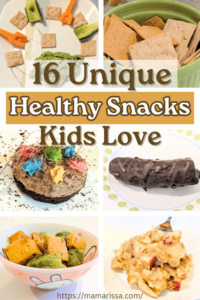
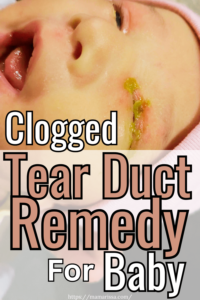
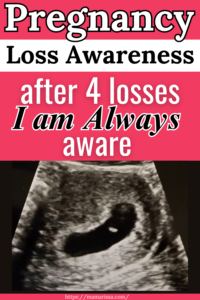

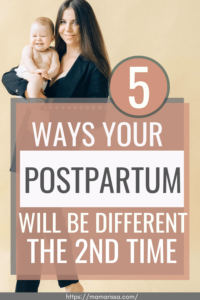


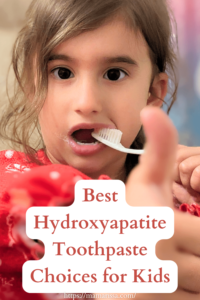
Leave a Reply